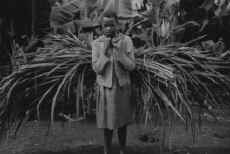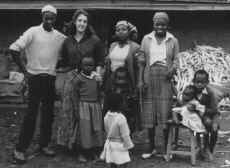Homestays on the Kikuyu shambas
|
|
 Arriving in the country Arriving in the country
Jonathan Tourzan
Our rural homestay was in the district of Muranga located in fertile highlands north
of Nairobi. This region was the home of the Kikuyu tribe, the largest in Kenya. Jomo
Kenyatta, Kenya's first president, was a Kikuyu.
The Muranga District is populated by families who make a living by working a shamba, a
Kiswahili word describing a small plot of land with just a few acres. The families grow
staple crops, such as maize, beans, potatoes, bananas, and cash crops, such as coffee or
tea. Muranga's rich soil and frequent rainfall make it a beautifully green and lush
paradise, and one of the most fertile farming areas in Kenya.
We traveled for over an hour to reach a small town which was the end of the line for
our bus. The bus dropped us off at Kandara Market where we went into a small hotel
(restaurant) and had lunch while we waited for Maina to find matatu to take us the last
few miles to our destination.
The open market offered a variety of fruits and vegetables, including multicolored
bananas that were particularly delicious. We were the center of attention at the market
where strangers were not a common sight.



 Arriving
in Paradise Arriving
in Paradise
Julie Paiva
I found myself surrounded by the most beautiful country I had ever seen—the
bright red dirt, the dark green trees, and the biggest, bluest sky in the world. I felt as
if I were in paradise and, more than once, seriously questioned whether I was dreaming. In
the fear of waking up, I quickly started running around, trying to see all that I could. I
did not want to miss anything.
I walked down to a river behind Baba Maina's house and ran into some children along
the path. I greeted them and tried to shake their hands, but they just laughed and ran
away.
|
|
I continued walking to the river while the children
continued running up to me, touching my hands and running away. I felt so happy and so
curious. Just like the children touching my hands, I wanted to touch every part of Kenya,
the land and the people.



Laura with her homestay family
 | It was not uncommon to be thrust into a family of eight or nine people.
|

 Getting
Aquainted Getting
Aquainted
Jonathan Tourzan
The matatu had taken us on a bumpy ride through lush green hills to Baba Maina's
house. In Kenya, adults are addressed as the parent of their eldest child; therefore, the
name Baba Maina means “father of Maina.”
David Maina's father had played a large role in organizing our homestays in Muranga
and turned out to be an invaluable friend. Baba Maina welcomed us to his home. He
explained that our homestay families would not arrive for a while and that we were free to
explore his land while we waited for our families.
The scenery in Muranga was spectacular. Green terraced hills stretched out across the
land as far as I could see. Almost all the land was used to grow crops of one kind or
another. Baba Maina's house was beautiful; he had one of the few houses with a concrete
foundation in the area. There were several goats in his front yard, and on the side of the
yard were two cows eating banana tree branches in a wooden cage. Below Baba Maina's house
was a beautiful stream that cut through the valley. We walked down the shamba to the
stream where we met a group of curious children. They would say, “How are you?”
and then bashfully run away. Some of them would hide in bushes when they saw us coming and
then jump out giggling after we had passed by. I think they thought that we might eat them
for lunch. They were so innocent, so pure.
|